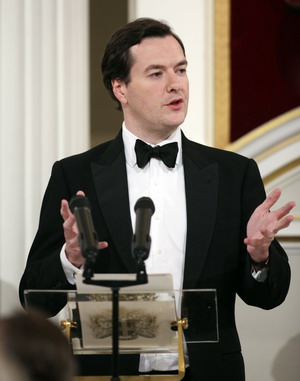-
News >Bizchina
Massive cuts loom over UK
2010-07-06 10:31
George Osborne, UK chancellor of the exchequer, speaks at Mansion House in London. [Agencies]
LONDON - UK government departments have been told to plan for spending cuts of as much as 40 percent as Chancellor of the Exchequer George Osborne seeks to narrow a record budget deficit.The Treasury has ordered most ministers to draw up scenarios for spending reductions of both 25 percent, the average figure specified by Osborne in last month's budget, and 40 percent over four years, Transport Secretary Philip Hammond said.
Prime Minister David Cameron's coalition of Conservatives and Liberal Democrats is proposing expenditure cuts and tax increases totaling 113 billion pounds ($172 billion) to slash a deficit of 11 percent of economic output. Osborne is due to set budgets for each department in a spending review in October once ministers have made their own proposals.
"What we're not going to do is slice 25 percent off every department," Hammond said. While no department will have to reduce spending by the full 40 percent, "some departments may see cuts a bit higher than 25 percent", he said.
Education Secretary Michael Gove is set to announce a reduction of as much as 3.5 million pounds in the schools budget, the Guardian newspaper reported. That will mean freezing plans to rebuild about 700 schools, the newspaper said.
Under the Treasury plans, Gove and Defense Secretary Liam Fox have both been asked to prepare proposals for budget cuts of 10 percent and 20 percent. The only departments exempted are health and international development.
"We are determined to tackle the record budget deficit in order to keep rates lower for longer, protect jobs, and maintain the quality of essential public services," the Treasury said in an e-mailed statement. "These planning assumptions are not final settlements."
The opposition Labour Party's home-affairs spokesman, Alan Johnson, told the BBC that the idea such large-scale spending cuts could be made without harming services such as policing was "fantasy land."
Ministers agreed to draw up the plans when the Cabinet met in Bradford, northern England, last week, the Treasury said.
Business Secretary Vince Cable's department will have to set out how it can reduce its spending to as little as 11.5 billion pounds by 2015 from 19.2 billion pounds in the current fiscal year. Gove's officials will need to draw up a blueprint to cut the education budget to 40.7 billion pounds from 50.9 billion pounds.The Institute for Fiscal Studies, a London-based independent research group, said the cuts to public spending would be the deepest since World War II and some departments would face reductions of a third. There will be 610,000 jobs cut in the public sector over the next five years as the spending squeeze is implemented, the government's new Office for Budget Responsibility said last week.
Ministers are due to meet civil-service union officials to discuss possible changes to the compensation terms for those who lose their jobs, the BBC reported.
"They want to bring redundancy arrangements into line with the private sector but not do anything about pay," Mark Serwotka, the general secretary of the Public and Commercial Services union, told BBC Radio 4 this morning. "There's no argument for any cuts in public services at all at the moment."
Hammond said that as far as his own department was concerned, "we will not have so much money to spend" on road and rail projects. "We will have to look at our priorities," he said.
"It is crystal clear that modernization and upgrade works will be axed," Bob Crow, the general secretary of the Rail, Maritime and Transport union, said in an e-mailed statement.
Bloomberg News
